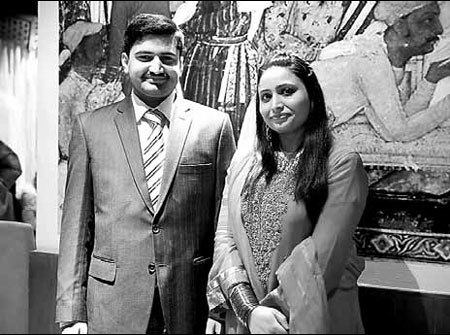Speaking the right language
Updated: 2013-02-15 10:59
By Liu Xiangrui (China Daily)
|
||||||||
Bushra Naz usually drops by the local markets after work to pick up cheap items and bargains just like other Beijing locals. After dinner she likes to lounge on the sofa and enjoy soap operas on TV or share the latest topics with her friends on her weibo, China's micro blog equivalent of Twitter.
After spending 10 years in China, the 32-year-old Pakistani national has fitted comfortably into place and lives a life "much like numerous other local white-collar workers".
|
 |
| Bushra Naz and her husband are enjoying their life in Beijing. Provided to China Daily |
"I enjoy my life here," smiled Naz, who has worked as an Urdu language broadcaster for China Radio International for four years. "Now I feel so close to Chinese people that I don't regard myself a foreigner."
At their newly decorated apartment in Beijing, Naz, in her traditional gown of bright red, sat on the sofa with her husband and reminisced about her decade in China. Her husband moved from Pakistan to live with her following their marriage two months ago.
Even before she arrived, China was not wholly alien territory, said Naz. Her father had visited China several times, while her sister worked in Beijing.
"They would tell me about China every time they returned from a trip," said Naz.
After switching between English and Chinese a few times, she politely asked to talk exclusively in Chinese, the language in which she is more proficient.
Her China experience began with the language, when she enrolled in a Chinese class after finishing high school in 2002. Later she was told about scholarships offered by Tongji University in Shanghai, and successfully became a Chinese major there.
In the first few months, life in China was harder than she had expected.
"I could communicate with my classmates in English. But it was difficult to get around," she said.
Naz was afraid to go out, unless accompanied by Chinese friends. She often unconsciously used exaggerated gestures when talking, recalled Naz, laughing.
However, the language, especially the tones, seemed so difficult at first that she almost gave up.
"I was afraid that I might have to go back to Pakistan," she said.
Naz is grateful to her language teacher, who spent two or three hours every week helping her practice. That time was well spent and her improvement was so rapid that she took first place in a test with 16 international students just a year after she began learning the language.

 Li Na on Time cover, makes influential 100 list
Li Na on Time cover, makes influential 100 list
 FBI releases photos of 2 Boston bombings suspects
FBI releases photos of 2 Boston bombings suspects
 World's wackiest hairstyles
World's wackiest hairstyles
 Sandstorms strike Northwest China
Sandstorms strike Northwest China
 Never-seen photos of Madonna on display
Never-seen photos of Madonna on display
 H7N9 outbreak linked to waterfowl migration
H7N9 outbreak linked to waterfowl migration
 Dozens feared dead in Texas plant blast
Dozens feared dead in Texas plant blast
 Venezuelan court rules out manual votes counting
Venezuelan court rules out manual votes counting
Most Viewed
Editor's Picks

|

|

|

|

|

|
Today's Top News
Boston bombing suspect reported cornered on boat
7.0-magnitude quake hits Sichuan
Cross-talk artist helps to spread the word
'Green' awareness levels drop in Beijing
Palace Museum spruces up
First couple on Time's list of most influential
H7N9 flu transmission studied
Trading channels 'need to broaden'
US Weekly

|

|







